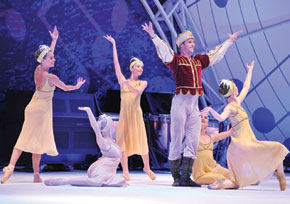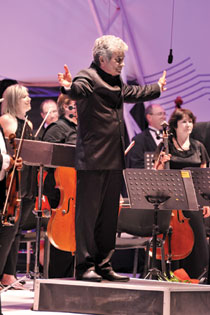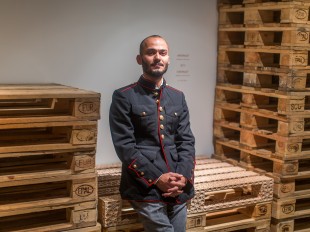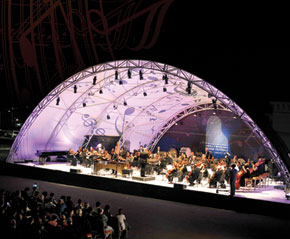 Yalchin Adigozalov conducts the Johannesburg Philharmonic Orchestra with soloist Chen Zimbalista on marimba
Yalchin Adigozalov conducts the Johannesburg Philharmonic Orchestra with soloist Chen Zimbalista on marimbaThe Caucasus Mountains provide an idyllic backdrop to the 6th International Music Festival. Ian Peart and Saadat Ibrahimova travel from Baku to soak up live concerts – planned, impromptu, open-air or otherwise.
Friday 25 July
Time for the 6th Qabala International Music Festival, a highlight of the Azerbaijani summer. We can’t spend the whole ten days there, but justify eight on the grounds that we can’t miss the mugham evening tonight. And it would certainly be impolite to leave before the finale of all the work put in by Artistic Directors Dmitry Yablonsky and Farhad Badalbeyli.
So The European Azerbaijan Society contingent sets off in two cars for the 3½-hour drive west. The first hour, rolling through the scrubby desert landscape to Shamakha, gives passengers the perfect excuse to glue their eyes to whatever hand-held screen they have. Once over the rise, though, the land becomes a more hospitable green and we're soon on the way to Shirvan's former capital. Since it’s Ramadan, we stop on the outskirts at the Pirsaat Baba shrine and make a financial offering or nezir to ensure a kindly response to prayers for a safe journey and family well-being. We continue, past the historic Yeddi Gumbaz tombs on the hill to our left, before heading up to a çay evi in Aghsu for tea among the trees. The ramshackle furniture adds perfectly to the ambience; slow sips of samovar tea with spoonfuls of home-made white cherry or peach 'jam' (a westerner might call it compote) – the ideal way to shed urban skins. Nicely chilled we get back in the car and continue to our final destination for lunch, unpacking, and the six o'clock chamber concert.
Ahaa, foreigners! Noticing the four of us who are, the TV crews pounce as we enter the hall. But it's no hardship to be polite for the pleasure to come: the soloists from the Vienna Akademik Orchestra – two violins, viola, cello, double bass, two French horns and oboe – take us through a spirited and expressive programme of Haydn and Mozart. Led by concertmaster Ilia Korol's infectious spirit, the musicians are precise and evidently enjoy their playing.
Open-air and free, the 9pm concerts are always popular with locals as well as visitors, but the mugham programme is a special attraction for Qabala-ites, so we head over early and sit at the feet of the VIPs on the stand behind us. What a treat, as Sahib Pashazade's tar leads kamancha, naghara, oud, qanun and balaban, and four excellent young singers, through folk songs and mughams. Mugham is open to interpretation and improvisation, and so always different. It is particularly spiritual when experienced live. The Sahib-led concert, progressing as the evening sky darkens over a green mountain backdrop, is a fine example. The singers combine to round off the evening with the traditionally rousing Qarabagh Shikestesi, sending the audience on its way with a spring in the step.
Back at the hotel lobby for a 'warm down' drink we find international company: Benjamin, a German musician learning Azerbaijani tar (he already plays Iranian tar); Helen, his Iranian dancer/violinist girlfriend; Hooriye, her violinist sister; Yoshito, a tar-playing Japanese student studying International Relations at the Diplomatic Academy; with Colleen, our Canadian, kamancha-playing librarian colleague. Tars and kamancha appear and an impromptu concert begins. A TV crew pricks up its ears: interviews! The Azerbaijanis support Colleen's voice on Lachin, Yoshi joins in on tar, along with Benjamin who proves his prowess, adapting beautifully to the smaller Azerbaijani instrument.
Saturday 26 July
Come afternoon we take a short ride to Nohur Lake. Two of our group decide on a horse ride, while the long queue for the single pedalo encourages the rest of us to indulge in a relaxing afternoon emptying the samovar for tea by the water’s edge.
We’re back in time for the 6pm chamber concert by tenor Azer Rzazade and pianist Mushvig Quliyev. Rzazade has developed remarkably in presence and expression over the last few years, clearly benefitting from his studies at Milan's La Scala. It's always a special pleasure to enjoy harnessed local talent and his performance endears him still further to an already devoted audience. The programme winds up to some Azerbaijani favourites. Hajibeyov's Sansiz (Without You) and Badalbeyli's Ave Maria are especially moving.
The 9pm outdoors is the first by guest orchestra Johannesburg Philharmonic (JPO). Admittedly, it takes a while to get going: Beethoven's Egmont Overture goes well enough, but Concerto No 3 for Piano and Orchestra feels its length, and even soloist Murad Adigozelzade struggles to get any depth from the upright piano he is required to play. The Brahms Symphony No. 1 is better but still wants for energy and bite. The JPO has a testing schedule with different conductors. It will be interesting to see how they progress.
Sunday 27 July
It’s mainly a catch-up, working day, then we gear up for Dmitry Yablonsky's Kiev Soloists (he is their director of music). No disappointment here. Yablonsky himself provides a beautifully absorbing lead through Bruch's Kol Nidrei for cello and strings. Bach and Mendelssohn concertos follow, with Tatiana Shafran soloing on the piano for the former. The energy of youth is given tight direction for a performance that elicits an encore, for which the popular choice is Amirov's Nizami Symphony.
At the outdoor concert conductor Yalchin Adigozalov turns just the right keys to bring the best out of the Johannesburg Philharmonic with a well-chosen progressive programme.
Tchaikovsky's Capriccio Italiano provides an easy and pleasurable start, Rachmaninoff's Variations on a Theme of Paganini is a fine prelude to the same composer's Symphonic Dances. Yegana Akhundova proves her right to be noted among the impressive current generation of Azerbaijani pianists. As the orchestra troops back afterwards through the hotel lobby, the lift in spirits is palpable. A real turnaround.
Monday 28 July
Some of us splash about and give breathing tips to newbies in the pool while others scale Tufandag mountain – in the new ski-lift gondolas – and enjoy the views from the heights over the town.
The 6pm concert presents a diversion; the Israel Brass Quintet’s performance includes appearances by a cigar-smoking oligarch, a tiger (toy), pink tutu and a tub of bubbles. These illustrate light-hearted arrangements of classical and contemporary favourites, with the trumpeted whinnying of horses embellishing Morricone’s spaghetti western score. Entertaining and played with evident skill, the Israel Brass Quintet promise a second concert with more serious themes.
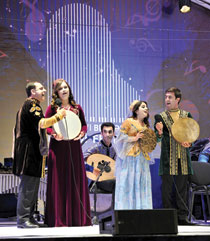 (From the left) Mugham singers, or xanəndə, Sabuhi Ibayev and Sabina Arabli, ud player Shafa Karimov, singers Kamila Nabiyeva and Sarkhan Bunyadzade
(From the left) Mugham singers, or xanəndə, Sabuhi Ibayev and Sabina Arabli, ud player Shafa Karimov, singers Kamila Nabiyeva and Sarkhan Bunyadzade The smiles, whispers and bounce in the musicians before the JPO’s concert also herald something different – what has maestro Adigozalov pulled out of the hat this time? The grey cloud stalking heavily up the valley towards us adds a little tension. But the Azerbaijani work that opens – Fikret Amirov’s driving Concerto for Piano and Orchestra – blows away any weather worries, especially with Farhad Badalbeyli, Music Academy rector and festival co-director, soloing in a popular performance. Then the piano moves out and makes way for a mass of percussion equipment stacked around a long marimba. So who is going to play Bach’s Concerto for Piano and Orchestra, up next?
The rabbit from Adigozalov’s hat is Israeli percussionist Chen Zimbalista. The concert becomes a thrilling whirl of bangs, bells and bongs as the rhythm man draws all into a performance ranging from Bach to Tchaikovsky to Piazzola to Bernstein. No foot goes untapped, no hand unclapped – conductor urges orchestra to fly with the maelstrom. Discovering later that orchestra and percussionist first met five hours before the concert, only raises the levels of admiration. Monday is definitely festival fun day.
Tuesday 29 July
Morning work segues into Segway. Resting from yesterday’s pool escapades, we whizz around the pool/sports complex on motorised two-wheel vehicles, after which the instructor attempts to entice us onto the quad bikes… next time, maybe.
It’s 6pm and the return of the Israel Brass Quintet – more restrained this time: a shofar ram’s horn replacing the tiger, and a misfiring transistor radio, add to music recognisably more native to the players and carrying more weight. We look forward to a reprise via the CDs they brought with them. The two pianos on the stage are then occupied by Gil Shohat and Oxana Yablonskaya; the former giving an impassioned and helpful introduction to the four parts of the Suite No. 1 by Rachmaninoff: Barcarolle, Love, Tears and Easter inspired by the poetry of Mikhail Lermontov, Lord Byron, Fyodor Tyutchev and Aleksey Khomyakov.
Umbrellas and even sweaters take the walk down to the open-air site for 9pm. As the JPO have a day off to explore nearby historical Sheki, we scramble again for seats to see the Tel Aviv Ballet Group give their interpretation of Qara Qarayev’s Seven Beauties. The music is familiar, especially with the recent release of the Royal Philharmonic’s CD version under Yablonsky’s baton, and the dance is largely traditional, with the packed local audience enjoying the Shah’s puzzlement and wonder at his enticing partners. An Israeli interlude follows the dance with Mark Kakon’s guitar accompanying Mira Awad’s vocals.
The midnight open-air jazz concert at the Riverside Hotel with Chen Zimbalista, Azerbaijani pianist Elchin Shirinov and friends begins – incredibly for Azerbaijan – an hour early. But we probably catch the best parts as the effervescent Zimbalista winds up an audience well fed and watered and happy to join in any way they can with the familiar finesse and electric saz.
Wednesday 30 July
The early concert gives Azerbaijani opera singers the stage. Farida Mammadova (soprano), Sabina Asadova (mezzo-soprano) from Baku’s Opera and Ballet Theatre, and young baritone Maharram Huseynov present Rossini, Bellini and Mozart in various combinations, before the ladies ‘miaow’ in competition for Huseynov’s attention in a lovely comic finale.
The open-air concerts just get better and better. Mozart and Dvorak are on the menu tonight and the JPO are working with their third conductor, Austrian Julian Rachlin actually combining the role with that of viola soloist when he and Israeli violinist Janna Gandelman follow the overture from The Marriage of Figaro with Mozart’s Sinfonia-concertante for Violin and Viola. Dmitry Yablonsky then comes under the baton for Dvorak’s Concerto for Cello and Orchestra in a performance of energy and sensitivity that draws repeated curtain calls before the enthusiastic audience exhausts its applause.
Thursday 31 July
At the 6pm concert Turkish sisters Bahar and Ufuk Dorduncu duet on piano works by Prokofiev (Cinderella Suite) and Ravel (Waltz and Sentimental Waltz). Prokofiev’s long opening suite proves too much for the concentration of some in the audience, not helped by the air-conditioning breaking down, and a technically very fine performance struggles against the restiveness that ensues. There is more to a successful concert than the music!
The JPO are back in perfect open-air conditions for the late concert. The sliver of moon dipping through a clear, darkening sky to the right of the stage casts a romantic air. And the music plays on. Conductor No. 4 for the JPO is Dmitry Yablonsky. His mother, Oxana Yablonskaya, is at the keyboard to play Rachmaninoff’s Concerto No. 1 for Piano and Orchestra with admirable power and spirit. Julian Rachlin returns in his double role, playing violin as he conducts an orchestra who are now performing with full confidence. He takes them through the three movements of Mendelssohn’s Concerto for Violin and Orchestra with barely a break. The fact that at the end both orchestra and audience are clapping the violinist maestro says all about a truly breathtaking performance. Back for Tchaikovsky’s Symphony No. 4, he restricts himself to conducting, but dispenses with the score. All his focus goes on inspiring the orchestra to musical heights in a piece more lyrical than the Mendelssohn. The result, however, is the same: players applauding enthusiastically, with the clapping audience on its feet.
Friday 1 August
During a writing morning, we receive a text from the Eagles of Azerbaijan in Aberdeen – another triumph last night; rehearsing today for two performances tomorrow in the final Gala show at the Aberdeen International Youth Festival. All going well.
The penultimate concert is a mix of somewhat more testing interpretations, as Brahms’ Trio for Clarinet, Cello and Piano is delivered – with particular sensitivity – by Julian Milkis on clarinet, Dmitry Yablonsky on cello and Denis Sungho on… guitar.
The closing concert celebrates operatic favourites sung by Azerbaijan’s leading lights with the JPO in full flow under a baton wielded with gusto by Ayyub Quliyev.
As the last notes of Magomayev’s Azerbaijan rise into the night sky, the realisation that we have reached the end begins to sink in. Fond farewells commence in the hotel, but the sweet sorrow of parting is delayed a little, as the night drive to Baku gives us a little time to help members of the JPO see some of the capital’s wonders before flying home. As they finally bus to the airport there are fervent wishes for a return visit by an orchestra that has given as much pleasure off stage as on.
Peta Ann Holdcroft, principal cello, and Malané Hofmeyr-Burger, flute, on the Johannesburg Philharmonic Orchestra’s Qabala experience
Anticipation
We were in South Africa, in the Kruger National Park playing for the rangers and raising funds for anti-poaching of the rhino. There was a discussion – in May, we might be going to Azerbaijan. We looked at the map… the confirmation came through!
I only believed it a week before, excited by the idea of so much in a short time: six concerts in six days with different conductors, and we had no idea who they were; if they were good. They have been wonderful. Participants and organisers took the event seriously and worked hard. It’s really been a fantastic week.
The visit from the ambassador made an impact. He was incredibly friendly, open and big-hearted. He told us, Listen, it’s a free, open country. You are welcome.
First impressions
The moment we arrived here, we immediately felt welcome. People have been so hospitable and generous. And coming into Baku – how amazing all the development is! It was a surprise, along with the landscape which changed completely, coming from a big city, going through the desert, to arriving in beautiful Qabala.
A similarity is that we have just celebrated 20 years of democracy, and there’s peace, joy and freedom that we’re all experiencing now. It’s very special to be here. If we had stayed in Baku, I don’t think we’d have seen this side of the country. And Sheki.... just waiting to be visited!
Music
Concerts here have all been of a very high level. The first night we arrived we heard the music of Azerbaijan (mugham – ed.) and it’s very foreign to us – a different scale, different sound, different instruments. For me, on a CD, I wouldn’t have listened to it, but here sitting and looking, it was beautiful; the music coming up from the stage, the mountains in the distance. It was very ethereal.
Festival
It’s been amazingly well-organised, the concerts especially. A big thing for classical musicians is if we’re mic’d. Usually it’s a problem, but here it’s top-of-the-art equipment. It’s lovely here, we have to keep this relationship. I’d love to come back, and we’ve had lovely compliments.
Coming here has expanded my world view. We will take this experience back to our country and tell others about it. And, it’s free! Usually these festivals are very expensive. The townspeople can just walk in, that’s very important.
To be playing such wonderful music with such wonderful conductors and wonderful soloists is what you train for. This week is everything that, as a musician, you wish for.
